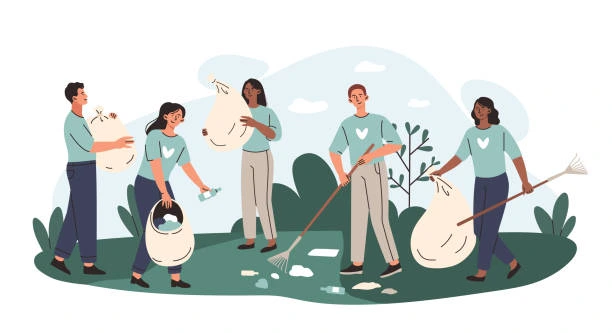Community Service & Volunteering: How It Helps in College AdmissionsApril 4, 2025

In today’s competitive college admissions process, academics alone aren’t enough to set you
apart. Colleges want students who demonstrate leadership, initiative, and a strong sense of social
responsibility. This is where community service and volunteering come in. Engaging in
meaningful volunteer work not only allows you to give back to society but also strengthens your
college application, making you a more well-rounded candidate.
Why Colleges Value Community Service
Admissions officers look beyond grades and test scores to find students who will positively
contribute to their college community. Volunteering showcases your commitment to making a
difference, your ability to work with diverse groups of people, and your leadership potential.
When you dedicate time to helping others, you develop key skills like communication,
teamwork, and problem-solving—qualities that colleges highly value.
Moreover, sustained community involvement tells colleges that you are not just checking a box
for your application. Instead, it signals a deep-seated commitment to social change,
demonstrating that you are likely to bring that same passion and drive to their campus.
How Volunteering Strengthens Your College Application
Community service has a direct impact on various parts of your college application. It serves as
evidence of your character and commitment, making your profile more compelling. One of the
biggest advantages is that it allows you to showcase leadership. Whether you led a project,
organized a fundraiser, or took the initiative to solve a local problem, admissions officers will see
you as someone who steps up rather than follows.
Additionally, your volunteer work can align with your academic and career goals, further
strengthening your application. For instance, if you’re interested in healthcare, volunteering at a
hospital or organizing a health awareness drive can highlight your passion for medicine. If you’re
considering a business degree, leading a fundraising initiative or helping a nonprofit with
budgeting can reinforce your interest in finance or entrepreneurship.
Long-term commitment to a cause also reflects well on your application. Colleges prefer
applicants who dedicate themselves deeply to a few meaningful activities rather than those who
spread themselves too thin. If you have been volunteering consistently for years, it demonstrates
dedication and reliability—two qualities that admissions committees appreciate.
Telling Your Community Service Story in College Applications
Simply listing your volunteer hours isn’t enough; how you present your experience matters.
When writing about your community service in essays or personal statements, focus on the
impact—both on the people you helped and on your own growth. Colleges want to understand
why you chose a particular cause, how you contributed, and what you learned from the
experience.
For example, instead of just stating, “I volunteered at a food bank,” elaborate on how you
worked with a team to organize food drives, engaged with struggling families, and gained a new
perspective on food insecurity. Admissions officers are drawn to personal stories, so sharing a
meaningful anecdote can make your application more compelling.
Another way to highlight your commitment is through recommendation letters. If you played a
significant role in a community project, consider asking a supervisor or organization leader for a
letter of recommendation. A strong endorsement from someone who has seen your dedication
firsthand can add weight to your application.
How to Find the Right Community Service Opportunities
Not all volunteer work has the same impact when it comes to college admissions. Instead of
participating in random one-time events, it’s better to find opportunities that align with your
interests and where you can take on meaningful responsibilities.
Start by exploring organizations at your school or in your local community. Many high schools
have community service clubs, and groups like Rotary Club, Key Club, and National Honor
Society offer structured volunteering programs. You can also look into nonprofits that focus on
issues you care about, such as education, environmental sustainability, or social justice.
If in-person volunteering isn’t feasible, consider remote opportunities. Many organizations offer
virtual volunteering, such as tutoring underprivileged students online, helping nonprofits with
social media management, or assisting in research projects. These experiences are just as
valuable and can demonstrate initiative and creativity.
Volunteering and Scholarships
Community service doesn’t just help with college admissions; it can also open doors to
scholarship opportunities. Many merit-based and need-based scholarships prioritize applicants
who have demonstrated a commitment to service. Programs like the Coca-Cola Scholars
Program and the AXA Achievement Scholarship specifically reward students with strong
leadership and service backgrounds. If you’ve dedicated a significant amount of time to a cause,
highlighting it in scholarship applications can increase your chances of receiving financial aid.
Common Questions About Community Service and College Admissions
1. How many hours of volunteering do I need for college applications?
There’s no magic number, but quality matters more than quantity. Colleges appreciate students
who show genuine, long-term commitment to a cause rather than those who rack up hours just
for the sake of it. Ideally, 50–200 hours of meaningful service over a few years is a strong range.
2. What if I don’t have time to volunteer due to my academic workload?
Even if you have a packed schedule, small contributions can make a difference. Consider
weekend or summer volunteering, or integrate service into school projects. Time management is
key, and colleges understand that students have different commitments.
3. Do Ivy League schools care about volunteering?
Absolutely! While community service alone won’t guarantee admission, it strengthens your
overall application. Ivy League schools and other top universities seek students who contribute
meaningfully to society, so well-documented service experiences can work in your favor.
4. Can volunteering be included in my college resume?
Yes! When listing volunteer work on your Common App or resume, be specific. Mention the
organization, your role, your responsibilities, and the impact of your work. Emphasize leadership
roles and any measurable achievements.
5. Is it better to volunteer for multiple organizations or stick with one?
Depth is more important than breadth. A long-term commitment to one cause demonstrates
passion and dedication, whereas scattered experiences might seem less impactful. Colleges
prefer to see deep engagement rather than a long list of brief experiences.
Final Thoughts
Community service is about more than just boosting your college application—it’s a chance to
develop leadership skills, learn empathy, and make a real impact on the world. Whether you’re
leading a local environmental campaign, tutoring younger students, or working with a nonprofit,
these experiences shape you into a more thoughtful and responsible individual.
By choosing meaningful opportunities, staying committed, and reflecting on your experiences,
you can make your volunteer work a powerful part of your college application. Not only will it
help you stand out to admissions officers, but it will also prepare you for a future of civic
engagement and leadership. If you haven’t started volunteering yet, now is the perfect time to
find a cause that matters to you and begin making a difference!




